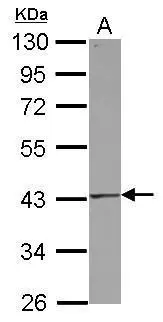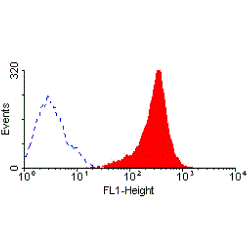
Sample (30 ug of whole cell lysate) A: K562 10% SDS PAGE GTX116024 diluted at 1:1000
Fas antibody [N3C2], Internal
GTX116024
ApplicationsWestern Blot
Product group Antibodies
ReactivityHuman
TargetFAS
Overview
- SupplierGeneTex
- Product NameFas antibody [N3C2], Internal
- Delivery Days Customer9
- Application Supplier NoteWB: 1:500-1:3000. *Optimal dilutions/concentrations should be determined by the researcher.Not tested in other applications.
- ApplicationsWestern Blot
- CertificationResearch Use Only
- ClonalityPolyclonal
- Concentration0.7 mg/ml
- ConjugateUnconjugated
- Gene ID355
- Target nameFAS
- Target descriptionFas cell surface death receptor
- Target synonymsALPS1A, APO-1, APT1, CD95, FAS1, FASTM, TNFRSF6, tumor necrosis factor receptor superfamily member 6, APO-1 cell surface antigen, CD95 antigen, FASLG receptor, Fas (TNF receptor superfamily, member 6), Fas AMA, TNF receptor superfamily member 6, apoptosis antigen 1, apoptosis signaling receptor FAS, apoptosis-mediating surface antigen FAS, mutant tumor necrosis receptor superfamily member 6, tumor necrosis factor receptor superfamily, member 6
- HostRabbit
- IsotypeIgG
- Protein IDP25445
- Protein NameTumor necrosis factor receptor superfamily member 6
- Scientific DescriptionThe protein encoded by this gene is a member of the TNF-receptor superfamily. This receptor contains a death domain. It has been shown to play a central role in the physiological regulation of programmed cell death, and has been implicated in the pathogenesis of various malignancies and diseases of the immune system. The interaction of this receptor with its ligand allows the formation of a death-inducing signaling complex that includes Fas-associated death domain protein (FADD), caspase 8, and caspase 10. The autoproteolytic processing of the caspases in the complex triggers a downstream caspase cascade, and leads to apoptosis. This receptor has been also shown to activate NF-kappaB, MAPK3/ERK1, and MAPK8/JNK, and is found to be involved in transducing the proliferating signals in normal diploid fibroblast and T cells. At least eight alternatively spliced transcript variants encoding seven distinct isoforms have been described. The isoforms lacking the transmembrane domain may negatively regulate the apoptosis mediated by the full length isoform. [provided by RefSeq]
- ReactivityHuman
- Storage Instruction-20°C or -80°C,2°C to 8°C
- UNSPSC12352203
References
- Chien MH, Chang WM, Lee WJ, et al. A Fas Ligand (FasL)-Fused Humanized Antibody Against Tumor-Associated Glycoprotein 72 Selectively Exhibits the Cytotoxic Effect Against Oral Cancer Cells with a Low FasL/Fas Ratio. Mol Cancer Ther. 2017,16(6):1102-1113. doi: 10.1158/1535-7163.MCT-16-0314Read this paper



![Various whole cell extracts (30 μg) were separated by 10% SDS-PAGE, and the membrane was blotted with Fas antibody [GT1169] (GTX09129) diluted at 1:500. The HRP-conjugated anti-rabbit IgG antibody (GTX213110-01) was used to detect the primary antibody.](https://www.genetex.com/upload/website/prouct_img/normal/GTX09129/GTX09129_40000000061_20200306_WB_w_23053123_690.webp)
![WB analysis of human FAS (AA: 87-278) recombinant protein using GTX60557 Fas antibody [4F8H6].](https://www.genetex.com/upload/website/prouct_img/normal/GTX60557/GTX60557_20170912_WB_1_w_23061123_994.webp)
![ELISA analysis of antigen using GTX60559 Fas antibody [4F8D6].
Black : Control antigen 100ng
Purple : Antigen 10ng
Blue : Antigen 50ng
Red : Antigen 100ng](https://www.genetex.com/upload/website/prouct_img/normal/GTX60559/GTX60559_20170912_ELISA_w_23061123_134.webp)

![FACS analysis of HUT78 cells using GTX75107 Fas antibody [LOB 3/17] (FITC).](https://www.genetex.com/upload/website/prouct_img/normal/GTX75107/GTX75107_3656_FACS_w_23061322_433.webp)
![FACS analysis of human peripheral blood using GTX78359 Fas antibody [LT95] (FITC).](https://www.genetex.com/upload/website/prouct_img/normal/GTX78359/GTX78359_20191025_AP_006_301_w_23061322_925.webp)